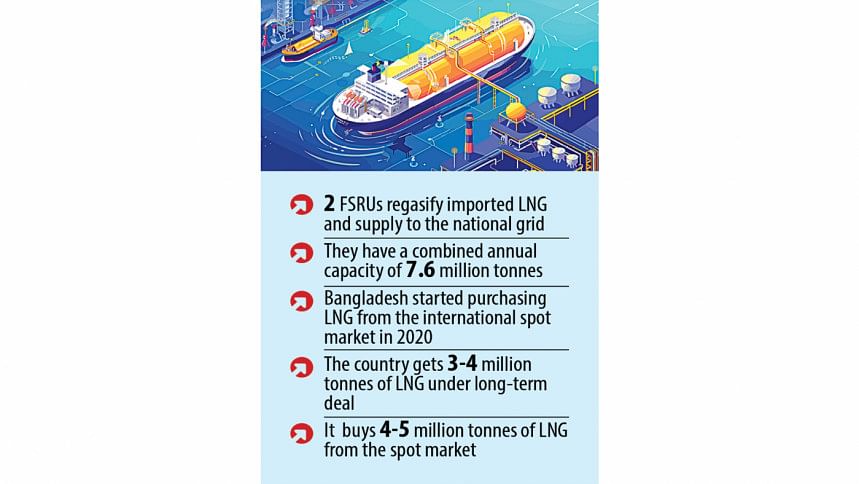LNG imports to be through public procurement rules

In a first for Bangladesh, the country's interim government is going to import liquified natural gas (LNG) purchased from the spot market in accordance with the Public Procurement Rules 2008.
The advisory committee on economic affairs gave its approval in this regard yesterday, according to the officials concerned.
During a meeting, the committee also approved LNG imports from 23 enlisted companies that have Master Sale and Purchase Agreements (MSPAs) with the state-owned Petrobangla.
The interim government found some truth to allegations over irregularities centring the purchase of LNG by the previous government, Dr Salehuddin Ahmed, finance adviser to the interim government, told journalists after the meeting.
However, investigations are ongoing and until concrete evidence is unearthed, the interim government will continue to purchase LNG from the existing enlisted companies, he said.
Md Rafiqul Islam, managing director of Rupantarita Prakritik Gas Company, one of the companies enlisted for importing LNG, said they have MSPAs with 23 global suppliers.
"Earlier, we invited them to quote their prices directly through email responses or an internal application within a very short notice. We awarded the offer that quoted the lowest price," he said.
"Now, the process will take place under public procurement rules. However, this will take more time than the previous method for importing LNG," he added.
It will take around seven to 14 days to get the quoted prices after a tender notification is made public under the public procurement rules, explained Islam.
Another official concerned believes that while the new method was a lengthy process, it would be more transparent than the previous one.
After taking charge, Adviser to the Ministry of Power, Energy and Mineral Resources Muhammad Fouzul Kabir Khan said they would stop using the Quick Enhancement of Electricity and Energy Supply (Special Provisions) Act 2010.
The act allows the power and energy sector to award public works without floating any tender notices.
The act was known as the energy sector's indemnity act, as it safeguarded the government's actions in the energy sector from judicial proceedings.
Khan also said they have instructed all energy companies to ensure competition in awarding public works.
At present, there are two floating storage and regasification units, which regasify imported LNG, with a combined annual capacity of 7.6 million tonnes.
Bangladesh started importing LNG from 2018 under two long term contracts with Qatargas and OQ trading, two companies of Qatar and Oman respectively.
The country then started purchasing LNG from the international spot market in 2020 to meet increasing local demand.
Under the long-term contracts, around 3 to 4 million tonnes of LNG are supplied each year, while the rest 4 to 5 million tonnes come from the spot market.
Meanwhile, in a meeting of the advisory committee on public purchase, the government decided to import 10,000 tonnes of lentil from Sahara Enterprise at Tk 98.20 crore under the Open Tendering Method.
As such, the lentils will cost Tk 98.20 per kilogramme.
At the same meeting, the government decided to purchase 30,000 tonnes of urea fertiliser from Fertiglobe Distribution Limited and another 30,000 tonnes from Karnaphuli Fertilizer Company Limited.
Also, the urea from Fertiglobe Distribution will cost about $343.17 per tonne whereas that from Karnaphuli Fertilizer $330.50 per tonne.

 For all latest news, follow The Daily Star's Google News channel.
For all latest news, follow The Daily Star's Google News channel. 



Comments